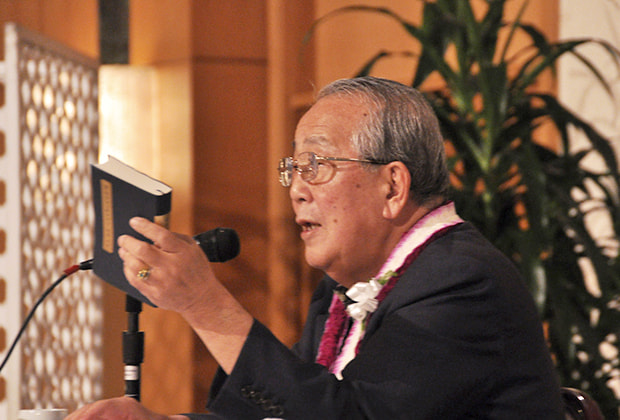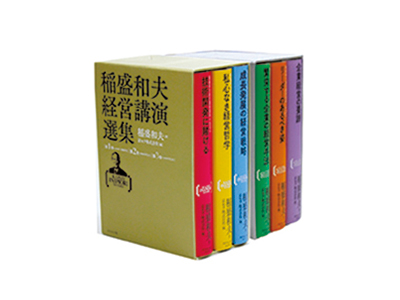Lectures
Why Do We Need Philosophy in Management?

This section introduces a speech Inamori gave during the Seiwajyuku Hawaii Inauguration Ceremony on January 20, 2010, focusing on the need for philosophy in corporate management.
This lecture is included in the book Selected Lectures on Management, by Kazuo Inamori, Vol. 6: The Essence of Corporate Management.
"What is right as a human being:" the basis of the Kyocera Philosophy
During my time at Shofu Industrial, whenever I identified a particular mindset or an attitude that struck me as necessary for doing my work, I would write it down immediately in the margins of my research and experimentation notebook. Later, when leading Kyocera, I would pull out those notes containing my personal views on the essentials of work, and add new details that had become apparent to me through my involvement in management. Those notes became the prototype of my management philosophy, now known as the Kyocera Philosophy.
"What is right as a human being" is the heart of the Kyocera Philosophy. This concept epitomizes an ideal way of thinking. In other words, the Kyocera Philosophy is founded on the most fundamental morals and ethics of our humanity.
Align the vectors of all employees

I did not implement the Kyocera Philosophy just by myself, and I made every effort to explain it to employees. This also drew reactions from some employees, who insisted that deciding what thoughts and philosophy to hold was the choice of the individual.
However, to realize the growth of employees within a group, such as a corporation, there must be some shared way of thinking that functions as a standard. Management is undertaken in line with such a philosophy in order to set and achieve high targets. Therefore, the vectors of all employees must be aligned with the way of thinking that is to become the standard.
Define rules and assumptions that codify the company's standards
The Kyocera Philosophy has three elements.
The first is "To define the rules and assumptions that codify the company's standards." In this world, there are many corporations without clearly defined decision-making criteria, rules or assumptions. This is why corporate scandals and wrongdoing are so commonplace, both historically and today, and in any country. Large corporations, especially, seemingly do not require their employees to consider even the basic question of "what is right as a human being."
However, the management philosophy I envision provides the answer to the question of what is right as a human being. If you examine it closely, you will find the answer in the most fundamental values of morality and ethics, as taught to us during childhood by parents and teachers ― Be honest; Do not deceive others; Do not tell lies. Because Kyocera has adhered to these fundamental decision-making criteria, the company has never veered in the wrong direction over the half-century since its founding.
Clearly define the purpose and goals of the company
As the second element, the Kyocera Philosophy clearly shows the purpose and goals of the company. In other words, it shows what manner of enterprise we want this company to be. Further, while presenting the goals to which the company should aspire, it embraces our own aspirations and objectives. The second element also covers what a corporation needs in aiming for high goals, and the mindset required to get there.
From the days when Kyocera still had fewer than 100 employees, we aimed to become "the world's leading ceramics maker." At the time, Kyocera's existence was so precarious, we could have been snuffed out by a sudden breeze. Aiming to become even the leading ceramics maker in Japan could have seemed rather unrealistic. Even so, I continued to urge employees to aim toward becoming a world-leading company. At the same time, I came to understand the necessity for a strict way of life and stoic way of thinking, as expressed through such concepts as "Aim high;" "Strive harder than anyone else;" and "Live each day earnestly."
Just as climbing a steep mountain requires rigorous training and good equipment, reaching high goals requires a corresponding way of thinking and methodology. The Kyocera Philosophy, by advocating a stoic, serious way of life, provides the ideal preparation, equipment and technique for climbing the high mountains targeted by Kyocera.
Give the enterprise a corporate character

As the third element, the Kyocera Philosophy summarizes the way of thinking and methods necessary for giving the corporation a wonderful character. Just as people have human character, a company should have its own corporate character. To build a wonderful corporate character, the philosophy must show the right way to live as a human being.
As it is based on universal perspectives of morality and ethics concerning what is right as a human being, the content of the Kyocera Philosophy is functionally effective in global management, transcending national borders. Today, Kyocera is a global corporation with many production sites and sales bases all over the world. More than half of Kyocera's employees are non-Japanese. The company is expanding into regions with differing languages, ethnicities, histories and cultures. Therefore, when managing a business in such diverse locations, leading people becomes especially important. In leading people, there are two roads: the "Ba Dao (the 'Way of Might')," which uses authority to keep people in line; and the "Wang Dao (the 'Way of Right')," which involves leading people through benevolence and righteousness. From start to finish, I believe people should be managed through trust and respect that have been earned through humanity and human virtue.
How, then, do we attain the trust and respect of others? Through wonderful character. We wanted all employees, both in Japan and overseas, to feel, "Employees of a company with a wonderful corporate character supported by a noble philosophy are indeed worthy of trust and respect. We should listen to what our leaders have to say." For this reason, there is a need for a high-minded, global and universal philosophy, one that gives a wonderful corporate character to business enterprises and gives employees opportunities to develop their own wonderful personal character as well.
Continue striving to enhance your own character
"How to apply it" is an important part of advocating the philosophy, including these three aforementioned elements, within the corporation.
Learning the right way to live as a human being and making it part of oneself appears to be simple, but is surprisingly difficult. As explained in Shimazu Jisshinko Iroha Uta (the Iroha Verses of Shimazu Jissinko), knowledge of outstanding virtues is meaningless if it has no practical applications. Alongside day-to-day self-reflection, we must apply earnest and ongoing effort to practicing the teachings of what is right as a human being. I believe the most important point is to elevate oneself through such effort, and thereby refine the soul, even if just little by little.
Notable Quotes from This Lecture

Here are some excerpts from what Inamori expressed in this lecture.
At the core of the Kyocera Philosophy lies the question, 'What is right as a human being?' It's about adhering to this right mindset. Essentially, the Kyocera Philosophy is based on the most basic human morals and ethics.
Just as people have personal character, a company should also be expected to have a corporate character. In my view, a philosophy is essential for corporate management, and for giving a company a corporate character.
People should be led through an appeal to their humanity, that is, human morality, to enable one to earn the confidence and respect of others.
We need to reflect constantly on our thoughts and actions, every day. Engage in day-by-day reflection, and continue to strive earnestly to apply your knowledge of what is right as a human being. Through such effort, refine the soul by even just a little, and raise yourself to a higher level. I believe this is the single most important aspect of implementing the philosophy.
Naturally, some people possess an admirable character, while others do not. However, even for those born with such a character, maintaining it throughout their lives is undoubtedly challenging.
From the Seiwajyuku Hawaii Inauguration Ceremony (January 20, 2010)

